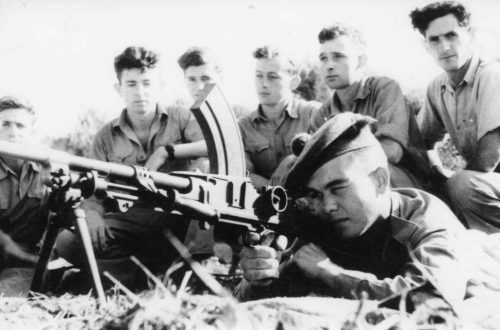This is a post by Mikey
Many readers of this blog will be aware of the antics of Tony Greenstein. What might not be known is that an organisation with which Tony Greenstein has been associated, was, as he now admits, both funded by and controlled by Saddam Hussein’s Iraqi Ba’ath party.[1]
While an activist in the student movement, Greenstein became prominent [2] in an organisation known as the British Anti-Zionist Organisation – Palestine Solidarity (BAZO). BAZO had been formed in 1975 [3] and in its early years it was simply known as BAZO or the British Anti-Zionist Organisation.[4] The appendage “Palestine Solidarity” was added much later.[5] The organisation became more well known in Britain in the late 1970s and early 1980s.
BAZO was particularly active in the UK student movement, and it was denounced by many left wing organisations as antisemitic.[6] One of the of left wing organisations that condemned BAZO for antisemitism was, as Greenstein admitted himself,[7] the Trotskyist Workers’ Revolutionary Party. Given the antics of this party, which was later exposed as to include spying on prominent British Jews for Libya,[8] it says something that they accused BAZO of antisemitism. Greenstein was one of BAZO’s top people having been on its Secretariat[9] and he distributed BAZO material at National Union of Students (NUS) conferences.[10]
One of the items that BAZO advertised at NUS conference that it sold was a book that implied that Anne Frank’s diary was a fraud. The president of NUS, David Aaronovitch, denounced the book as antisemitic and ordered it withdrawn from conference. The NUS executive issued a statement declaring “the actions of BAZO help antisemites in their activities.”[11] The Jewish Chronicle reported that NUS conference also declared BAZO’s journal Against Zionism! to be antisemitic, and, noting the similarity between BAZO literature and National Front literature, called upon NUS to ban BAZO activities from any campus in the United Kingdom.[12] In fact, BAZO had distributed the same material as promoted by both the neo-Nazi British Movement[13] and the National Front.[14] BAZO was indeed banned from holding a stall at NUS conferences or advertising in NUS publications.[15] It had resorted to booking a stall at an NUS conference by using a fictitious name: “Anti-Imperialism in the Caribbean.”[16] BAZO had been based at Strathclyde University, which it had used as its address, but had all facilities withdrawn from there as well.[17]
The Chairman of BAZO was Dr. George Mitchell. According to a news report in the Jewish Chronicle, “Dr Mitchell attended a Jewish Society meeting at Strathclyde and took photographs of those present, threatening to send the pictures to Beirut.”[18] At a BAZO meeting, the speaker asked:
Why did the Jews not bomb the ovens at Auschwitz and so stop the killings in the last war? With all the money they have, they could have got an air force. The Holocaust – the killing of six million in Europe – was done by Nazis working with the Jews.[19]
What is of particular interest about BAZO is the funding from and control by Iraqi Ba’ath party that Greenstein admits. The Iraqi Ba’ath party were, in Greenstein’s own choice of word, the “piper” calling the BAZO tune.[20]
The main Ba’ath organisation on campus was the National Union of Iraqi Students (NUIS), an organisation that existed not just in the UK, but also in other countries where Iraqi students were studying. According to the dissident Iraqis, NUIS were financed directly by the Iraqi government.[21] BAZO were known to have organised a nationally advertised joint public meeting with NUIS.[22]
Dissident Iraqi students who had spoken out against repression in Iraq were the victims of violence by NUIS members. Violent confrontations were occurring on campuses. As an example, at Swansea University, Iraqi students who condemned repression in Iraq were set upon by other Iraqis. At the University of Manchester Institute of Science and Technology (UMIST), NUIS members turned up armed with chains and other weapons to an event organised by dissident Iraqis. The NUS executive was so concerned about the violence by NUIS that not only did they recommend that NUS and local students’ unions derecognise NUIS, but they brought the matter to the attention of the Foreign and Colonial Office.
It was David Aaronovitch, as National Secretary of the National Union of Students, who compiled the report detailing the violence. He declared in May 1979, “Unless swift action is taken, I believe we could witness Iraqi gunmen turning up on university and college campuses in this country.”[23] This claim by Aaronovitch was not far-fetched. NUIS violence was occurring throughout Europe. In December 1979, in Bulgaria, there was a pitched battle between NUIS members and opposition. Over fifty casualties were reported including one 17 year old Iraqi student who was stabbed to death. In the same month it was revealed that the Home Office were investigating claims of four Iraqi students appearing on death lists drawn up by the Ba’ath party.[24]
Because David Aaronovitch became publicly associated with the report on the Iraqi student violence, NUIS particularly detested him. At an NUS conference in 1980, according to Aaronovitch, “forty NUIS members turned up and a large number of delegates were treated to their particular brand of verbal harassment.” He added that he was personally threatened with a beer glass.[25]
In January 1980 a letter purporting to come from the Embassy of Israel and addressed to David Aaronovitch was distributed to national newspapers and union presidents. The letter thanked Aaronovitch for his “great efforts at the recent NUS conference” and offered him finances and printing facilities in his campaign to be NUS president. The letter was declared a forgery by the Guardian and the Israeli Embassy. But this did not stop BAZO from publishing the letter under a headline “Aaronovitch – Time for Some Answers.” BAZO fired a number of questions such as “Has Aaronovitch ever been in contact with the Zionist Embassy in London or its representatives? And if so, when and for what purpose?” It declared: “It is no longer possible to deflect interest in this matter by sheltering behind shrieks of ‘Forgery.’” In a message directly to Aaronovitch they stated, “this journal opposes you and those who take your stand, because of the dark, reactionary, and sinister forces which are standing behind you, and we intend to expose these to the light of day.” At one point, in their campaign against Aaronovitch, BAZO published a picture of him together with the words, “Remember his name, remember his face.”[26]
Aaronovitch declared: “the slander campaign against me was almost certainly the work of Iraqi officials interested in the question of [NUS’s] de-recognition of NUIS.”[27] The Guardian also implied that it was supporters of the Iraqi regime behind the forged letter.[28] The distributors of the libel were BAZO. Greenstein admits BAZO were controlled by Ba’ath funders. He has stated that when he had enough proof to be aware of this, he resigned.[29] This subsequent resignation does not alter the fact that – by being a leading light in BAZO and a distributor of their material – Tony Greenstein was carrying out activities that Saddam Hussein’s men would have approved.
It is time for Greenstein to come clean: to set the record straight and provide a full and detailed explanation about his involvement in BAZO, and the organisation’s funding and control by the Iraqi Ba’ath party.
End Notes:
[1] Comment by Greenstein to Facebook, June 13, 2012 at 17:37. A screenshot of which is in the author’s possession. An extract of the text of this comments is as follows:
When I found enough proof to convince me that BAZO was funded by the Iraqi Baathists I resigned, about 30 years ago now. So what? Is being funded by Saddam Hussein any worse than being funded by the United States? By that token the whole of the Israeli state is corrupt and beyond redemption. What I objected to most of all was not that one or other Arab regime might fund it, why not, it’s the Arab peoples’ money being used for something good, but that funding was used to control the organisation and that was what I objected to. He who pays the piper..
[2] Jewish Chronicle, April 17, 1981
[3]“Foreword by the British Anti-Zionist Organisation – Palestine Solidarity,” in Jews Against Zionism and Anti-Semitism (Melbourne, Australia), Nazi-Zionist Collaboration, (British Anti-Zionist Organisation, 1981).
[4]Guardian, May 15, 1976 and Guardian, November 4, 1977.
[5]Constitution of the British Anti-Zionist Organisation – Palestine Solidarity (BAZO) passed at its fourth annual conference, in Against Zionism! Volume II, Number 3, (BAZO-Palestine Solidarity, n.d., circa 1980).
[6]The Times, October 1, 1984.
[7]New Statesman, July 11, 1980.
[8] Solidarity Journal, Spring 1988.
[9] Jewish Chronicle, August 27, 1982.
[10]Jewish Chronicle, January 2, 1981.
[11]Jewish Chronicle, April 10, 1981,Jewish Chronicle, July 10, 1981, Jewish Chronicle, July 24, 1981, Jewish Chronicle, August 14, 1981 and Jewish Chronicle, August 28, 1981.
[12]Jewish Chronicle, January 2, 1981.
[13]Jewish Chronicle, April 3, 1981.
[14]Jewish Chronicle, April 10, 1981.
[15]Guardian, April 2, 1981.
[16]Jewish Chronicle, April 10, 1981.
[17]Jewish Chronicle, May 1, 1981.
[18]Jewish Chronicle August 24, 1979.
[19]Jewish Chronicle March 23, 1979.
[20]Comment by Greenstein to Facebook, June 13, 2012 at 17:37(See note 1).
[21]Observer, February 8, 1981.
[22]Guardian, November 17, 1980.
[23]Guardian, May 21, 1979.
[24]Guardian, December 21, 1979.
[25]New Statesman, July 11, 1980.
[26]Guardian, January 28, 1980 and Against Zionism! Volume II, Number 3, (BAZO-Palestine Solidarity, n.d., circa 1980).
[27]New Statesman, July 11, 1980.
[28]Guardian, January 28, 1980.
[29]Comment by Greenstein to Facebook, June 13, 2012 at 17:37.(See note 1).


